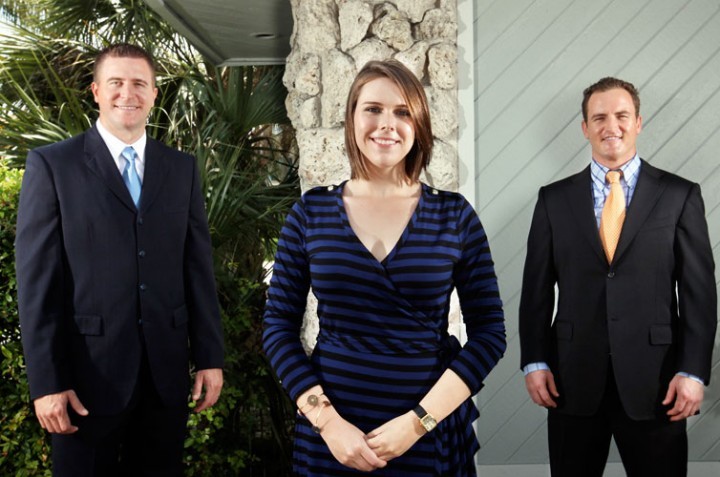VERO BEACH — What Kelly Kite and Joseph Schlitt are doing for investors is using proven strategies and today’s internet research capabilities to produce the highest return on something individuals have been doing for decades – buying up tax lien certificates at auction.
Delinquent property taxes create an opportunity to earn interest – in some cases double-digit interest – until the taxes get paid.
In most cases, property taxes eventually are paid, but there’s also the outside chance that the holder of the tax lien will wind up with a parcel of land or a building at the end of the investment.
Kite and Schlitt, looking at the brutal 2008 real estate market, decided tax liens could be a great way to use their skills and professional networks.
The effort started out close to home as Kite and Schlitt mastered the technology, honed their skills in the bidding process and researched the various types of properties for which tax liens were put up for bid, but now the company is expanding its investor pool.
“The first year it was a very small group including Joey and me. There were only five of us the first year and we bid primarily in local counties,” Kite said. “When it comes to the idea of tax liens, it’s a pretty easy sell because the investment is collateralized.”
Schlitt said his family, one of Vero’s real estate sales and development dynasties, has invested in tax liens in Indian River County as a personal investment, for close to 60 years.
Before internet auctions, liens were offered up live by an auctioneer. Some places still do it that way, but Kite said 60 of the 67 Florida counties have set up online auctions.
Kite Tax Lien Capital currently bids in 44 of those counties and has bid in Colorado. In the future, it is researching auctions in other states with high interest- rate yields.
Accessing auctions via the internet opens up opportunities, but it also opens up the auctions to competition from other companies.
On the internet, bidders enter the lowest interest rate they’re willing to accept for buying the tax lien and the bidder who entered the lowest interest rate wins.
Though possibly land rich, property owners may be temporarily cash poor and many look at the months under which their properties have a tax lien on them as a low-interest loan with easy terms.
“You don’t have to apply for and qualify for a loan, and what credit card is going to give you interest that low?” Schlitt said.
Using specialized software and public records databases, Kite and Schlitt identify auctions that might not fall within the normal criteria of the banks or of other bidders.
The target properties are commercial buildings and land, agricultural properties, homes that are being rented and second homes. The company only invests in non-homesteaded properties.
“We decided from the beginning that we didn’t want to be in the position of having to foreclose on someone’s primary home,” Schlitt said.
Once they identify the properties to bid on, Kite and Schlitt bid a high percentage on those, sometimes as high as 18 percent. Because of the labor-intensive administration to keep track of each lien, there is a break-even point which works best for their business plan.
Due to the high interest rate bids, Kite said the company only wins about one of 100 auctions it enters – but the ones it does win come with pretty large payoffs, an average of more than 14 percent, paid monthly on the first day of the month until the delinquent taxes are paid by the owner.
Kite Tax Lien Capital currently holds more than 6,000 tax liens in its portfolio. Since the business opened three years ago, the company has researched, acquired and managed more than 10,000 tax liens.
Average interest rates earned are 5 to 7 percent statewide. To get above-average returns, the double-digit returns which Kite Tax Lien Capital touts to investors, that’s where the research, diligence and strategy come into play.
One strategy is to acquire title to property and to sell it. If the liens Kite Tax Lien Capital buys are not paid off within 24 months, the company may file a tax deed application with the tax authority, such as the county tax collector.
That starts the process of possibly selling the property to pay off the back taxes, something which used to take three to six months, Kite said, but now takes up to one year due to the volume of sales.
Though they accept investors from the general public, Kite and Schlitt said that, until now, new clients have come in the door via of family, friends and business associates.
“We’ve also been reaching out to other people in the financial industry, but most of our investor base is here in Vero Beach. We don’t do any marketing,” Kite said.
The time commitment for the current fund is seven years, after which investors will reap whatever proceeds the tax liens bring in over that time – either from interest or property sale.
Kite said publication of the tax liens every spring always generates some buzz about liens, but the group of investors for this year was already finalized by late April. Now would be the time to investigate investment opportunities for 2013, Kite said.

